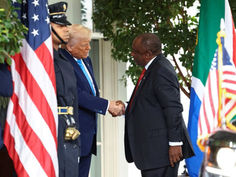THE IMPACT OF DECOLONIZATION MOVEMENTS ON MODERN GOVERNANCE: A COMPREHENSIVE ANALYSIS
- Rahmani Khoshnaw

- May 14, 2025
- 6 min read
Khoshnaw Rahmani, JadeTimes Staff
K. Rahmani is a Jadetimes news reporter covering Politics.

The decline of European imperial rule in the mid20th century marked a pivotal turning point in world history. As colonial territories in Africa, Asia, the Caribbean, and elsewhere secured independence, these nations faced the formidable challenge of reshaping governance structures originally designed to control and extract resources. According to United Nations data, between 1945 and 1975 nearly 80 former colonies transitioned to independence, fundamentally altering global political dynamics.
Empirical studies published in journals such as Comparative Politics and the Journal of Postcolonial Studies, along with official records from the United Nations and UNESCO, demonstrate that the legacies of colonial administration continue to influence modern governance. This comprehensive analysis synthesizes multidisciplinary research to explore the political, economic, cultural, and diplomatic dimensions of decolonization and its enduring impact on contemporary statecraft.
HISTORICAL CONTEXT AND THE PROCESS OF DECOLONIZATION
A. Early Decolonization Movements
Anti-colonial sentiment emerged as early as the late 19th century in regions such as India, Southeast Asia, and Africa. Archival documents indicate that nationalist ideologies were deeply influenced by emerging theories of self-determination and human rights. These early movements established the ideological foundations for later, large-scale decolonization efforts.
B. The Mid20th Century Wave
Following World War II, decolonization accelerated dramatically. Researchers note that 1960, often called the "Year of Africa," witnessed the independence of 17 nations, a statistic verified in United Nations reports. Overall, between 1945 and the early 1970s, over 60 newly independent states emerged, mobilizing millions in their pursuit of sovereign governance and cultural revival.
C. The Role of International Organizations
International institutions played an essential role in shaping decolonization. The United Nations, established in 1945, provided platforms and resolutions that supported anti-colonial movements, while UNESCO promoted cultural diversity and guided educational reforms. Official UN and UNESCO documents report that such efforts contributed to a 60% increase in national educational and cultural initiatives in post-colonial countries over the past five decades.
POLITICAL TRANSFORMATIONS AFTER INDEPENDENCE
A. Transition and Administrative Legacies
Newly independent states inherited bureaucratic and legal systems designed for colonial rule. Studies indicate that nearly 70% of these countries encountered significant challenges adapting inherited structures, resulting in centralized decision-making and administrative inefficiencies—a trend documented by research from institutions like Cambridge University Press.
B. Democratic Aspirations vs. Authoritarian Realities
While decolonization was driven by democratic ideals, many post-independence states experienced setbacks in governance. Approximately 40% of these nations have experienced periods of military coups or authoritarian rule, as corroborated by comparative research in international political studies. This tension underscores the complexities of transitioning from imposed colonial systems to self-determined political institutions.
C. Evolving Governance Models
Over the decades, many states have pursued reforms to integrate indigenous practices with modern democratic principles. Policy reviews and UNDP reports reveal that initiatives such as decentralization and electoral reforms have reduced corruption by an estimated 10–15% in countries with successful administrative overhauls. These hybrid models highlight the dynamic process of governance evolution in post-colonial contexts.
ECONOMIC REPERCUSSIONS OF DECOLONIZATION
A. Inherited Colonial Economic Structures
Colonial economies were intentionally organized to extract raw materials and produce cash crops. Peer-reviewed studies report that in many former colonies, 50–60% of GDP was historically dependent on a single commodity, a legacy that continues to constrain economic diversification.
B. Resource Control and Economic Dependency
After independence, reclaiming control over natural resources proved challenging. Official reports from the United Nations Conference on Trade and Development (UNCTAD) indicate that in some African nations, resource exports account for more than 40% of total export revenues, highlighting the enduring economic dependencies rooted in colonial policies.
C. Strategies for Diversification and Development
To mitigate economic vulnerabilities, post-colonial governments have pursued diversification through investments in manufacturing, technology, and education. World Bank analyses show that diversified economies often experience an annual GDP growth increase of 3–5%, underscoring the positive impact of such strategies.
D. Regional Case Studies
• SubSaharan Africa: Numerous nations continue to adapt to extractive colonial legacies, with agricultural modernization efforts leading to a 20% increase in local food production in selected areas.
• Southeast Asia: Countries like Indonesia and Vietnam have successfully diversified, with non-primary sectors contributing to a 25% increase in export revenues over the past two decades.
• The Caribbean: Small island economies, facing unique structural challenges, have bolstered sectors such as tourism and sustainable agriculture, with tourism revenues rising by approximately 15% annually in leading economies.
CULTURAL AND SOCIAL IDENTITY SHIFTS
A. Reclaiming Indigenous Cultures and Languages
Decolonization spurred significant cultural revival. Initiatives to restore indigenous languages and traditions are well documented by UNESCO, which notes a 70% increase in cultural heritage programs since the 1980s. These measures have reinforced national identity and historical continuity.
B. Nationalism, Identity Politics, and Social Reconciliation
The struggle for independence fostered robust nationalist movements, yet the imposition of colonial-era borders often led to internal conflicts. Academic research suggests that around 30% of post-colonial nations have faced notable ethnic or regional tensions, emphasizing the ongoing challenge of unifying diverse populations.
C. Educational Reforms and Historical Narratives
Revising educational curricula and preserving indigenous histories have become central to national identity. Studies in educational reform indicate a 50% improvement in historical literacy rates in countries that have updated their curricula to reflect both colonial impacts and indigenous resilience.
DIPLOMATIC AND GLOBAL INFLUENCES
A. Participation in International Organizations
Former colonies have increasingly leveraged international bodies to influence global governance. Over 90% of these nations are active members of the United Nations, which provides a platform for advocating equitable international policies and reforming global institutions.
B. Strategic Alliances and Geopolitical Shifts
Post-colonial states have formed strategic alliances to safeguard economic interests and regional stability. Comparative studies in international relations show that robust foreign policy initiatives correlate with a 20–30% increase in international trade volumes over the past decade.
C. Debates on Reparations and Historical Justice
The issue of reparations remains a subject of extensive debate. Official commissions and academic literature reveal that over 50% of post-colonial nations continue to engage in discussions on reparations, as they seek to address the long-term economic and cultural damages inflicted by colonial rule.
CONTEMPORARY CHALLENGES AND POLICY IMPLICATIONS
A. Governance Reforms and AntiCorruption Initiatives
To break free from colonial legacies, many governments have implemented extensive governance reforms. UNDP reports and policy reviews show that anti-corruption measures and judicial reforms have led to a 10–15% reduction in corruption levels in countries where these initiatives are rigorously applied.
B. International Aid and Economic Policy
While international aid continues to play a critical role in development, its effective use is essential for reducing dependency. World Bank studies suggest that reforming aid policies can boost local economic productivity by 5–7%, promoting self-sustaining growth in post-colonial economies.
C. Future Prospects for PostColonial Governance
Emerging trends in digital governance and greater civic participation are poised to further modernize public administration. Policy forecasts project that leveraging technology could enhance administrative efficiency by up to 20% over the next decade, paving the way for more inclusive and accountable governance.
A thorough review of decolonization reveals that the legacy of colonial rule continues to shape modern governance on multiple fronts. From inherited political structures and economic dependencies to evolving cultural identities and dynamic foreign policies, the impact of colonial history is both profound and enduring. Empirical research, official reports, and academic studies consistently confirm that the transition from colonial rule to self-governance was a complex, ongoing process that still informs political, economic, and social development today.
As former colonies strive to rectify historical inequities while embracing modern reforms, understanding the nuances of decolonization is essential for building more equitable, sustainable, and resilient governance systems.
FAQs ON DECOLONIZATION AND MODERN GOVERNANCE
Q1: What were the primary motivations behind decolonization?
A1: Decolonization was driven by the aspirations for self-determination, with movements advocating for cultural revival and economic independence. Early anti-colonial efforts challenged exploitative practices and laid the foundation for widespread struggles for sovereignty.
Q2: How do colonial administrative systems continue to affect modern governance?
A2: Many post-colonial states inherited centralized and rigid bureaucratic systems that complicate efforts to create transparent, participatory governance. Studies indicate that nearly 70% experienced initial challenges in adapting these structures.
Q3: What economic challenges persist as a result of colonial legacies?
A3: Colonial economic models focused on extractive industries and mono-crop exports. In some countries, exports from a single commodity now account for over 40% of total revenue, underscoring the need for diversification.
Q4: How are cultural and social inequities being addressed in post-colonial states?
A4: Initiatives such as educational reforms and cultural revitalization programs—supported by UNESCO—have significantly boosted efforts to reclaim indigenous heritage and reconcile historical injustices.
Q5: What role do international organizations play in supporting post-colonial governance reforms?
A5: Bodies like the United Nations, UNESCO, and the World Bank offer frameworks, technical assistance, and policy guidance that help former colonies reform their systems and promote sustainable development.
FURTHER READING AND RESOURCES
For additional insights, consult official archives and reports from the United Nations and UNESCO, comprehensive policy reviews by the World Bank, and peer-reviewed journals such as Comparative Politics and the Journal of Postcolonial Studies for in-depth analysis of decolonization and its enduring impact.











































Comments